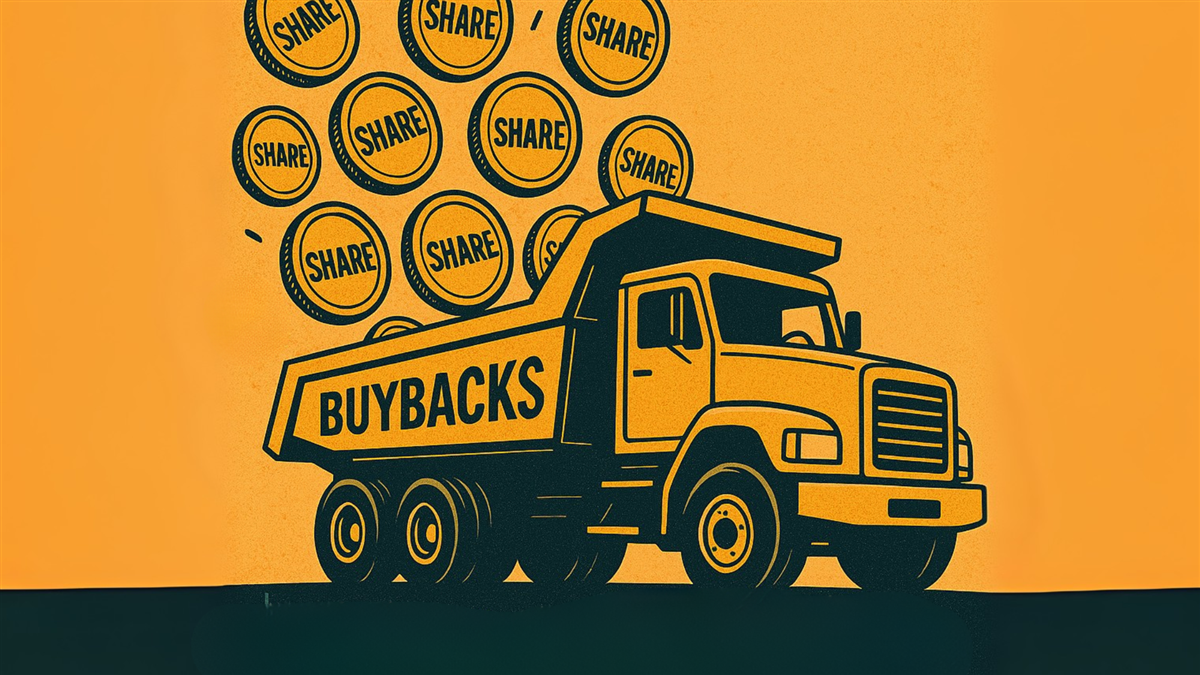 Companies often engage in share buybacks when they see upside in their stock. This perception often manifests in one of two key ways: their shares are dropping or rising.
Companies often engage in share buybacks when they see upside in their stock. This perception often manifests in one of two key ways: their shares are dropping or rising.
When a company’s shares are dropping, management can see a buying opportunity as they believe markets are overreacting to bad news. A recent example of this is Deckers Outdoor (NYSE: DECK). The company’s stock is down nearly 50% in 2025. In response, they spent a record $266 million on buybacks in Q1 and notched their third-highest level of quarterly spending in Q2 at $183 million.
When a company's share prices are rising, it may buy back stock, believing that markets may be under-appreciating the company despite an already strong sentiment. This seems to be be the case for Spotify Technology (NYSE: SPOT), VeriSign (NASDAQ: VRSN), and Newmont (NYSE: NEM).
All three stocks are outperforming the market in 2025 and have just announced big increases to their share buyback capacity. Management is sending a clear signal that they believe the rally in their respective stocks will continue, setting up a potentially fruitful opportunity for investors going forward. Here’s how those moves connect to performance and what investors should take from them.
Spotify: Riding a 40% Rally with an Additional $1 B Buyback Authorization
In 2025, Spotify stock is up approximately 40%, far surpassing the less than 7% return of the S&P 500 Index. This very strong return comes even as the firm saw shares drop by over 11% after reporting earnings on July 29. Within its earnings release, the goliath of music streaming announced a $1 billion increase to its share buyback authorization.
The stock’s recent fall, combined with the buyback increase, would allow the firm to spend big on its own stock at what it likely views as a depressed price. This signals that the company expects the stock's overall rally to continue mid-term. Spotify’s advertising business is currently in flux, and hopes it will have a big year in 2026.
VeriSign: Structuring a 6% Market Cap Buyback Amid Berkshire’s Stake Shift
VeriSign has provided a total return of approximately 29% so far in 2025. In its latest earnings release, the company announced a $913 million increase to its share buyback authorization, bringing its total capacity to around $1.5 billion, roughly 6% of its market value.
That relatively high percentage gives the firm a substantial opportunity to lower its outstanding share count, allowing VeriSign to put a large tailwind behind its earnings per share (EPS) and signaling confidence from management going forward.
Warren Buffett’s Berkshire Hathaway (NYSE: BRK.B) is notably one of the largest shareholders in VeriSign. Investors may feel Berkshire's recent agreement to sell 4.3 million VeriSign shares indicates that the firm may be bearish on the stock. However, VeriSign notes that the reason is to reduce Berkshire's ownership to below 10% for regulatory reasons and will still hold a massive stake in Verisign. This should put investor concerns to rest, but any further sales from Berkshire may warrant heightened concern.
Newmont: $3B Buybacks on Gold’s Breakout Rally; Analysts See $4,000/Oz Potential
Major gold mining company Newmont has achieved a 70% return this year so far. In its latest earnings report, Newmont announced it added $3 billion to its share buyback capacity, bringing the company’s total capacity to $3.2 billion, around 4.6% of its market capitalization. The company says this increase demonstrates “the confidence that we have in our business.”
Analysts at J.P. Morgan see gold prices, currently around $3,350 per ounce, rising to $4,000 per ounce by mid-2026, which would certainly help keep Newmont’s impressive rally going. Forecasts like these add credence to Newmont’s reasoning in boosting its buyback capacity.
Buybacks Are Positive, but Don’t Ignore Incentive Bias
Overall, it is a good sign for investors when companies choose to substantially increase their ability to buy back stock. When done alongside strong cash flow and discipline, buybacks can amplify shareholder returns while reducing outstanding shares. In these three cases—Spotify, VeriSign, Newmont—the increases coincide with above‑market returns in 2025 and suggest continued belief in underlying drivers.
Still, it is important to take buybacks with a grain of salt. Management wants to see its shares rise, as they are often compensated in stock. As such, buyback authorization is sometimes used to prop up stock artificially. That doesn’t make the signals invalid, but it does mean investors should look deeper to make sure the companies are generating sustainable free cash flow, have realistic earnings forecasts, and that buybacks aren't being prioritized over more strategic investments.